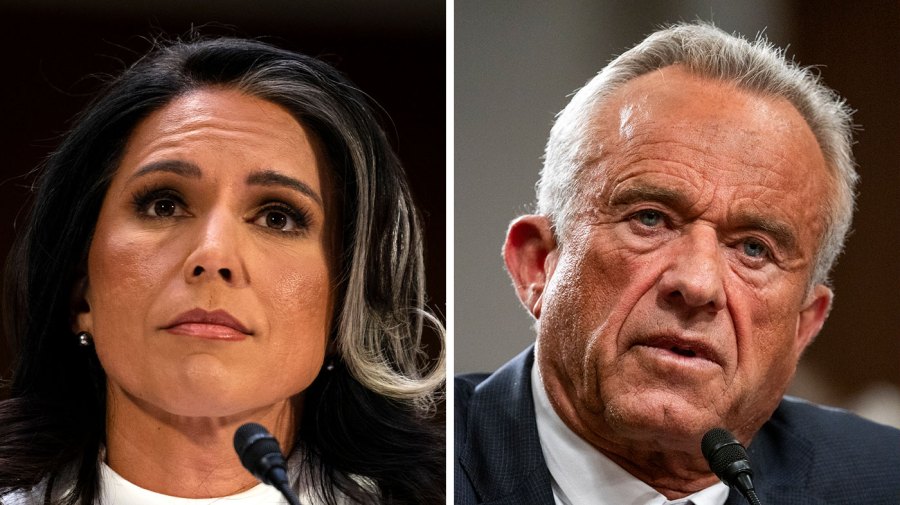Tulsi Gabbard and Robert F. Kennedy Jr. are staring down crucial tests on Tuesday as Senate committees will decide whether to advance their nominations to the floor amid increasing pressure from allies of President Trump.
The pair of contentious nominees are facing key panel votes that will determine the future of Trump’s picks to lead the U.S. intelligence apparatus and the Department of Health and Human Services, respectively.
The votes will come just days after each had perilous moments during their confirmation hearings that appeared to raise fresh doubts among GOP lawmakers.
The Senate Finance Committee will vote Tuesday morning on Kennedy, while the Intelligence panel is expected to do so behind closed doors for Gabbard in the afternoon.
“I think [they’re] both going to be fine,” said Sen. Markwayne Mullin (R-Okla.), a top ally of Trump and Senate Majority Leader John Thune (R-S.D.).
“I was very confident in [Kennedy] throughout the process. … I said we had work to do with Tulsi. Tulsi’s done the work and I feel good where we’re at.”
Neither Gabbard nor Kennedy are expected to win any support from Democrats, and must win over skeptical Republicans on the committees.
For Gabbard, the key Republican vote is Sen. Todd Young (R-Ind.). There are nine Republicans on the panel and eight Democrats, meaning Young could end Gabbard’s chances if he votes against her.
Young was one of several Republicans and Democrats who pressed Gabbard on whether she thought Edward Snowden, the ex-NSA contractor who leaked myriad classified documents and fled the U.S., is a traitor.
She repeatedly said that Snowden broke the law, but refused to label his acts traitorous.
Young, a former Marine intelligence officer who never formally endorsed Trump’s 2024 campaign, was visibly miffed while questioning Gabbard over the issue.
“It’s notable you didn’t say, ‘Yes, he clearly hurt, in various ways, our national security,’” Young responded at one point.
His potential opposition pushed Trump allies into overdrive over the weekend to heap pressure on him.
Leading that effort was Elon Musk, who posted on X that the Indiana Republican is “a deep state puppet.” Musk eventually deleted the post after talking directly with Young, saying later that the senator is “a great ally in restoring power to the people from the vast, unelected bureaucracy.”
A Young spokesperson told The Hill that the two had a “great conversation on a number of subjects and policy areas where they have a shared interest, like DOGE.”
The Indiana senator indicated he was still undecided, telling reporters: “You guys will hear more from me tomorrow.”
Nevertheless, top Senate Republicans were optimistic Young would get on board.
“Todd’s in a good place. I think Elon handled that very well. … I think Todd is doing just what [Sen. Thom Tillis] did,” Mullin continued, pointing to how the North Carolina senator tried to find clarity on allegations facing Defense Secretary Pete Hegseth in the hours before his vote to lead the Pentagon.
“He’s being very methodical, asking the right questions, trying to where he needs to be to feel good about where he needs to go,” Mullin added.
Gabbard also got a big win on the eve of the panel vote as Sen. Susan Collins (R-Maine), who had also been considered a swing vote, announced that she will support her. Collins had previously indicated she was worried about Gabbard’s stance on Section 702 of the Foreign Intelligence Surveillance Act, but said in a statement that comments about Snowden and the role of the DNI pushed her into the “aye” column.
Collins also told reporters that Gabbard “elaborated further on her reluctance” to label Snowden a traitor.
Meanwhile, Kennedy also has a singular focus: winning over the support of Sen. Bill Cassidy (R-La.), a member of the Finance Committee who could single-handedly end his confirmation hopes.
Cassidy, a medical doctor, was visibly upset during Thursday’s hearing after he gave Kennedy multiple opportunities to step back from unfounded claims he made in the past linking rising reported cases of autism to vaccines. Kennedy refused and eventually told an exasperated Cassidy that he could meet with the senator to show him more information.
“I have been struggling with your nomination,” Cassidy told Kennedy at the end of Thursday’s Senate Health, Education, Labor and Pensions (HELP) Committee hearing. Kennedy appeared for two confirmation hearings, but only the Finance Committee will vote on whether to advance him. Cassidy sits on both panels.
The Louisiana Republican told reporters at the Capitol on Monday that he was still “working through” Kennedy’s nomination, adding that their discussion over the weekend was “cordial.”
Republican leaders indicated that talks were continuing in order to get the pair through each panel.
“We’re continuing to talk to our members,” Senate Majority Whip John Barrasso (R-Wyo.) said, adding that those talks would be continuing on the floor Monday night during votes.
There’s been chatter around the Capitol about the possibility of getting Gabbard to a floor vote even if she doesn’t win the support of all nine GOP members on the panel, though it’s unclear if Republicans will attempt the maneuver.
Normally, nominees are voted out “favorably” or “unfavorably,” but members and allies of Trump have left open the possibility of allowing her to escape the panel without any formal recommendations. Mick Mulvaney became director of the Office of Management and Budget in 2017 after a similar maneuver at the committee level.
However, Thune said last week that does not see that happening.
Even still, the White House remains upbeat about their ability to get the green light from members.
“I’ve gotten a great response,” Trump said in the Oval Office about their prospects. “I think we will do well.”






Leave a Reply